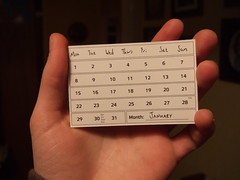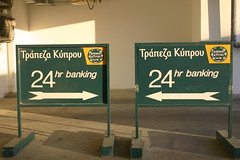Earlier, I posted about 5 Ways to De-Clutter and Simplify Your Life but in December, we're going to take this to the next level.
Being surrounded by material possessions weighs heavily on our minds. Sometimes I wonder how big the next place I move to should be just to fit all these things in. I wonder why I keep those DVDs on my shelf that I haven't watched in ages. My wardrobe, whilst not big could do with a trim. And all those other empty appliance boxes, folders of papers and books I haven't touched in a while just sit there staring at me.
And all the time, I think about doing something about these things.
Starting Out ...
Over time, people generally acquire lots of stuff. Each time they move, they shift it with them and since the new place is bigger, it's easier to acquire even more stuff and have it diffuse into the house like all the other belongings.
A spring clean every now and again removes parts of it, either to the charity shop or the rubbish dump but mostly, it just gets dusted and put back. Those things that haven't been used in a year or so but still being kept for the sake of it.
I've managed to do this with a few things since I downsized to my newer smaller flat but I still have lots of stuff, everywhere, all over the place. It'd be nice if this wasn't the case and I could actually get rid of a lot of it.
... and Finishing Off
This December, I challenge you to start filtering through all those secret cupboards you have left closed for eternity, those drawers that seem completely jammed and those cardboard boxes in the attic or garage that haven't seen the daylight since the turn of the Millennium. Just a little bit here and there will make a huge difference. How much? 15-30 minutes a day. That's not much but, as with Personal Finance, many small changes add up to a large difference over the long term.
Not only that, but once you've filtered your possessions you'll find it hard going back and acquiring more stuff. This not only helps your peace of mind but also your wallet.
The Act of Filtering
A friend told me the other day that she has three piles: Keep, Charity and Throw Out. This sounds like a good plan since then you know exactly what you're doing with every single item you find.
You might like to add a Sell pile too but this is your choice. Maybe you have a Give to Nephew pile or a Recycle pile and of course, you may have others but the best way to do it is to keep it simple. Also, as and when you look at each item from that cupboard, drawer or box, make a decision there and then as to what you're going to do with it. The worst thing you can do is decide to decide later.
Say 'No' to a Don't Know Pile
Whatever you do, do not have a pile called Don't Know since that will just assimilate back into that stuff you didn't actually know you owned. After all, the point of this exercise if to get rid of things, not just shift them to another location in the house.
As I said, pick up each item and put it into one of the definitive piles. That way, when you look at it in the future, you know exactly what you're going to do with it (assuming you haven't already done something with it already).
Do a Little Every Day
By doing just a little bit every single day, you'll be amazed at how quickly you can get through your stuff. I shall be taking this challenge and posting one or two updates throughout the month so we can compare notes on how we're doing.
You might wonder if December is a good time for doing this since it is a very busy time of year but I suspect that this will work out well for even the busiest house host. Instead of leaving all of your tidying up until a week before Christmas and New Year then just start now and see where you are in two weeks. I suspect if you did a bit every day until mid-December you'd be more ship-shape than if you left it until later.
So what are you waiting for? Get sorting through that stuff and let's have a clear, clean, stress-free and simple Christmas and New Year.
And remember to let me know how you're getting on in the comments, state that you're partaking in the challenge and blog about it so we can spread the word.










